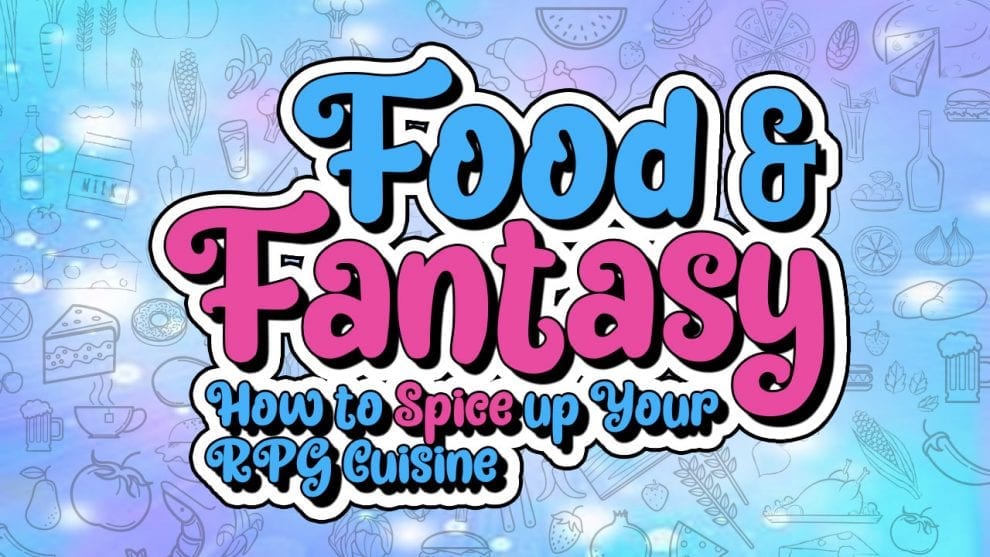In the world of tabletop roleplay, many of us play games filled with gods, monsters, and magic. Our characters explore ancient crypts, hunt dragons, and live in a world of power and mystery. Knowing the fantastic lives of the people we play, you can’t help but ask the question: why do we turn our imaginations off when it comes to food? Why can every adventurer be found with a leg of turkey and a mug of beer at an unassuming tavern?
In this article, I’m going to talk about a few different ways we can spice up food in our games.
Part 1: Eat Local
Even today, what’s on your plate is probably very different from the country next-door. If we imagine a world without our level of global trade or without easy refrigeration, this effect only becomes more pronounced.
In our games we often act as vagabonds, moving from one community to the next. When we arrive in a new place, there are a lot of different ideas we might want to consider:
- What’s in season? If we’re arriving during harvest time, we’re going to see a very different spread of food on offer than we would in the dead of winter. Is there more hunted meat in the winter? Does the community rely on preserved goods and spare rations, or are there sturdy root vegetables that can last the whole year? What’s a rare treat because it’s out of season? What’s cheap because it’s still readily available?
- How do customs influence palettes? Not everything edible will be eaten. Is there anything that’s taboo to eat in this region? Some communities might have religious reasons to avoid one source of food, or feel that certain cuts of meat or types of grain are only fit for animals. Are there parts of an animal that are a delicacy here? Is eating dragon seen as sinful?
- What are the food sources here? Is this community agrarian? Are they a coastal town that eats a lot of fish? Are they hunter-gatherers who only take what they need from the forest? Is it too barren, too cold, too cursed to grow anything in these lands? What specialty product is this area known for? Is this a cold climate with a wealth of meat and fish, or a tropical climate with a longer growing season for fruits and vegetables?
Part 2: What Is Food?
Food means different things to different people. Food can be cooked different ways, eaten different ways, and spiced different ways. Across all parts of a society, a single ingredient can have a whole history.
- How are things preserved here? Is food salted heavily to keep from rotting? Is a layer of fat used to seal jars? Has fermentation become a way to enjoy food, not just to preserve it? How does food change when it’s dried, or pickled, or smoked, or frozen? Does this northern community actually love its salted demonfish eyeballs with pickled cabbage, or is it just a way to get by?
- What options does wealth open up? If a type of food is harder to grow, harvest, or prepare, it’s going to be more costly. The troll fat used in these pastries had to be kneaded for hours to remove the poison — that’s going to make it more expensive. The stamen of the princess flower is a precious spice — is that because it needs to be picked by hand? These humming cattails are a weed, and they keep for months without spoiling — that’s going to be cheap, perhaps sold as a mash or turned into a flour. What can your adventurers afford? And what do establishments serve in the part of town they’re staying? Are we in a manor, or a poorhouse?
- How can different parts of the same crop or kill be used? Particularly in places with scarcity, these communities will want to take full advantage of their harvests. Is the blood boar’s horn whittled into an instrument? Are the bones boiled for a copper-tasting soup? Once the giant mushrooms are whittled out to live inside, how do they cook and eat the spores?
- Can everyone eat this? If you’re playing a game with different enough characters, you might not be able to eat the same things. What do lizardfolk eat? Is this poisonous to the gnome because of her small body size? Is this monster too close to being your relative? Can your ghost still eat (and oh my god, what does that look like?).
Part Three: Time to Celebrate
Food isn’t just something you eat to stay alive! It’s also a big part of culture, tradition, celebration, and maybe even intoxication.
- What’s on the menu for special occasions? Everyone needs a treat, right? What’s eaten here in times of plenty? Is there a little treat that follows or begins a special meal? What do children always ask for on their birthday? Is there a sacred food or a dish made in tribute to the gods?
- Are there rituals around food? When people get together, it’s not just about food. Do your characters or the people that live here have a tradition they uphold? Maybe they say grace, or maybe they wash their feet. Maybe everyone has to bring one ingredient forward to the meal. Maybe the oldest person eats first. Maybe food is eaten from a single bowl in the center of the table, everyone taking handfuls of stew and slurping.
- What about alcohol? For something to be alcoholic, you need to have some kind of sugar that’s turned into alcohol. That leaves us so many options. What wild ideas can you think of for the local drink of choice? Sure, you can have beer — but what grain is it made of? Are there stills to make hard liquor? Is alcohol frozen to concentrate it (like applejack)? Think about the ways the local drink can seem alien without it just being “too strong”.
There are so many ways to imagine food in your story. Get a little experimental with it — the fun is in the details you slip in that make people smile or think.
Some homework: choose or create one plant or animal in your world, then imagine three different ways parts of it are eaten. I would love to see you share these in the comments.











Add Comment